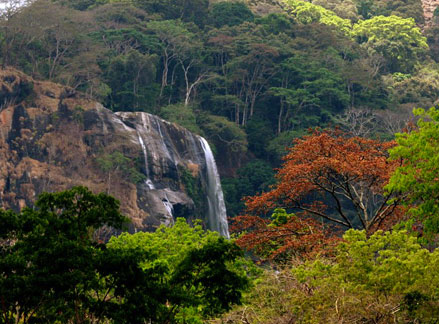


Days and Nights in the Forest
by JBP

![]()
Days and Nights in the Forest
Carolyn Ehardt’s journey to a base camp in Tanzania’s Udzungwa Mountains National Park begins in a well-worn vehicle. That’s the cushy part. Climbing out of her cramped conveyance, she directs her crew to load up equipment — binoculars, computers, tents and first-aid kits.
Field sites can be an arduous three-day trek up steep mountains, along meandering animal trails and through forests interspersed with fire-prone grasslands. A three-week foray may require 40 porters, each carrying 45 pounds on his head.
Ehardt, a University of Georgia primatologist, studies ecology, biogeography and conservation of Sanje mangabeys, Highland mangabeys (which her team co-discovered in 2004), colobus monkeys and nocturnal galagos.
Once a bare-bones camp is set up, the real work begins. Around 5:00 a.m., researchers head into the forest, tape recorders in hand. Galagos (bushbabies) return to their nests just before sunrise, giving species-specific vocalizations, said Ehardt, who maps their distribution.

Shortly after dawn, researchers return to camp for a breakfast of rice and beans — oatmeal if they’re lucky. Individual teams then assess distribution and relative abundances of primates, birds and other larger mammals, walking slowly all day through forests, stopping every 100 feet to look and listen. As night falls, teams reassemble for supper and then venture into another part of the forest to record galagos’ vocalizations as they awake. Back at camp, “you go into your tent and collapse,” Ehardt said of the demanding research. “Every year those mountains get taller!”
Ehardt’s most recent research — a yearlong ecological study of Sanje mangabeys — required following an habituated group from sunrise to sunset, collecting an assortment of mangabey data: from births and disappearances to use of forest resources.
“You have to move with them over difficult terrain, spend entire days for months and years,” she said. Challenges include strict research permissions, getting adequate funding and aggressive mambas, elephants and Cape buffalo.
“While walking along an animal trail, all of a sudden you’re within 10 or 15 meters of something very powerful and dangerous,” she said. “You also worry about being three-days’ walk into a forest and someone breaking a leg. We certainly cannot bring helicopters in there.”
A colleague once injured his leg and developed a massive infection. “He was throwing up and running incredibly high fevers. We were about a two-day walk from the nearest road. It was really scary.”
Physical rigors aside, getting results can be painfully slow. “You must be satisfied with minimal production coupled with maximum effort for a very long time,” said Ehardt, who describes her team as “wonderful collaborators and essential to the success of the research.”
Success also requires strong interpersonal skills and diplomacy, said the team’s only female. “My African male collaborators and assistants don’t know quite what to make of me. To have a woman spending weeks hiking and camping in the forest, and responsible for tough decision-making and payroll — these are not typical activities for Tanzanian women.” The men often help her pitch her tent or let her grasp a shoulder while plunging through a fast-moving river.
“We were once in an especially remote forest, sitting around the campfire talking, and Tom [Butynski, a primatologist and research collaborator] said, ‘You know, you are probably the first non-African woman that’s ever been in this forest. Wait a minute. You may be the first woman that’s ever been in this forest.”
The Udzungwa mountains’ pristine forests are becoming fragmented and degraded by logging and other human activities. Animals that need large ranging areas are getting crowded into smaller forest fragments, a situation Ehardt calls “very dangerous” to the long-term survival of forests and their inhabitants.
She and colleagues see their work as a noble calling, worth the long-term commitment and inconveniences. “When I’m hungry, tired or dirty, and I haven’t been in a bed or had a hot bath for weeks. I think, ‘Carolyn, why are you doing this?’ Then I know why. I would not choose any other way.”
For comments or for information please e-mail: rcomm@uga.edu
To contact the webmaster please email: ovprweb@uga.edu
![]()